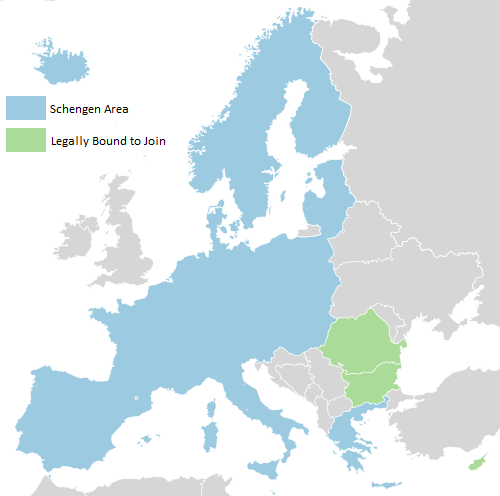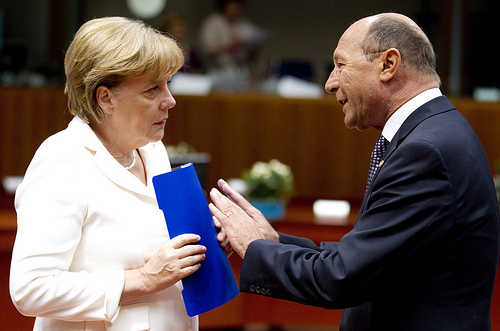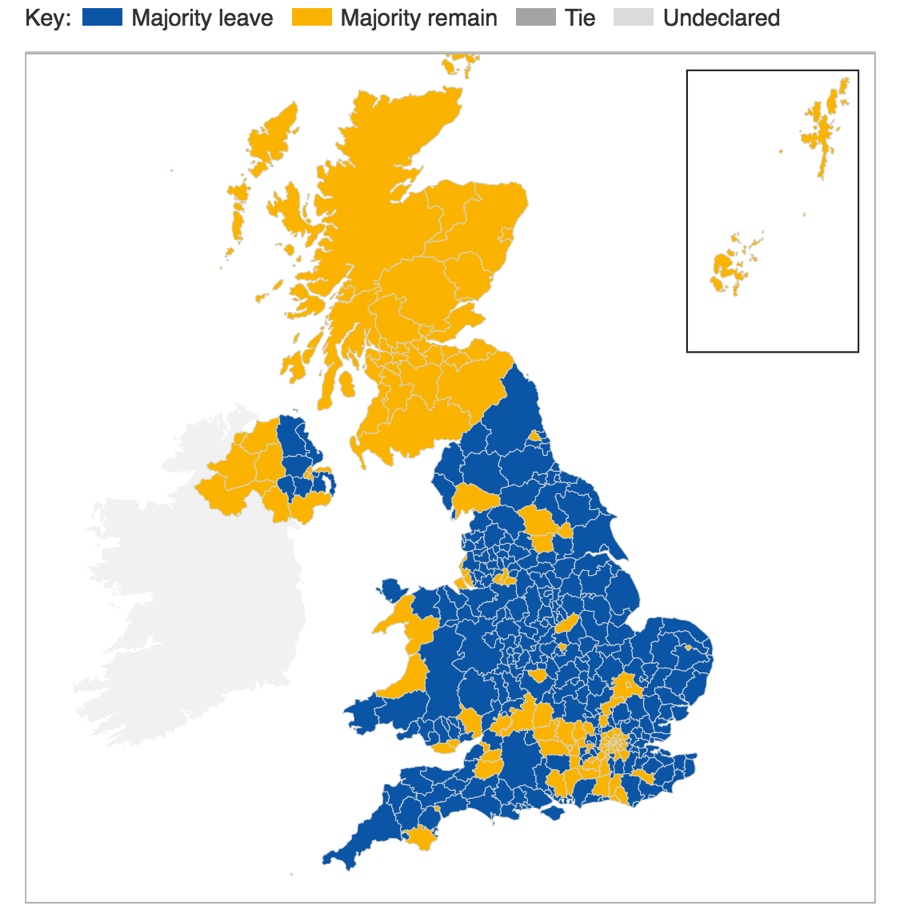Europe
Discord in European Union: Why Should Romania and Bulgaria fight for Schengen
Earlier this week, European Commission has expressed its continuous support to European Presidency’s efforts of including Bulgaria and Romania into Schengen area. It is a big diplomatic win for Romania, the country which has faced rejection to the entry in the Schengen region several times along with Bulgaria.
In May 2011, The European Parliament’s civil freedoms committee had approved a recommendation for Bulgaria and Romania to joined Schengen free-travel zone. The principal condition for the nations joining the multinational Schengen zone is their ability to ensure the security of the EU’s external borders. In this case Romania, which borders non EU states of Moldova, Ukraine and Serbia; and Bulgaria, which borders non EU states of Turkey, Macedonia and Serbia will own the responsibility of securing their borders not just for themselves but for the whole European Union. When the South East European countries of Romania and Bulgaria were close to achieve their dream, The Netherlands, in the meeting of the EU Council of justice and interior ministers postponed their adhesion to Schengen region for 2012, saying ‘these two countries may enter the Schengen area only after they carry out effective judicial reforms.’
Time to time Germany, The Netherlands and Finland have played their cards to block or postpone the entry of the two countries. In September 2011, Netherlands and Finland urged the two bidders to do more to fight corruption and organized crime.
This year in March, Germany and the Netherlands again launched a strong protest to prevent Romania and Bulgaria entering into the region saying at this stage it would be premature, due to rampant corruption there. During the meeting of Ministers of Interior and Justice of the European Union, in Brussels, unfortunately for both the countries the decision was again postponed to the end of 2013, when they will be again judged on the eligibility criteria. On this occasion, German interior minister, Hans-Peter Friedrich in Brussels said “There are some areas of weakness, such as in the functionality of the judicial system, that prevents us from saying: abolish the borders,” said Friedrich. He warned Germany might witness an influx of untrustworthy people, migrating there “without further control”.
 |
| Schengen Area, Image by Ssolbergj |
After all these development and use of power against the two countries, do we think Romania really needs the entry in the Schengen area?
Romanian Foreign Minister, Titus Corlatean said, “We have lived without entry to the Schengen zone for a long time, and we can live without it for a longer time as well.”
To know what Romanians think about their membership of European Union we asked Gabriela Ionita, Editor in Chief, Power&Politics World.
TWR: What do Romanians think about Germany preventing them to enter Schengen Agreement Last Month?
 |
| Gabriela Ionita, Editor in Chief Power&Politics World |
Gabriela Ionita: Romanian people have many other real problems. Discussion about the opposition of some country like Germany, Netherland (official) or France (unofficial) is rather an issue of mass-media agenda. According to a poll, there were in fact seven states that expressed their disagreement regarding Romania`s accession to Schengen zone. Sure, we can speculate about the fact that three of these states are run by the family of European political parties where its part also actual in power party PSD, and the four belong to the European political family where is part opposition party PDL. However, the position of a State to the Schengen expansion is not linked necessarily to European policy, but domestic policy and how it will affected the State. Hans-Peter Friedrich, German Interior Minister and member of the Christian Social Union (CSU), part of Chancellor Angela Merkel’s party, publicly announced that Germany will use its veto, if required, to prevent Romania from joining the Schengen zone. But, we must not forget that Germany is one of the states that negotiated the plan of Romania’s accession to Schengen in two stages, thus overcoming the deadlock from 2012 in the talks on the accession of Romania.
TWR: What do Romanians feel about EU? Are they happy to join it in 2007? What are the significant positive changes in Romania after joining the EU?
Gabriela Ionita: If we look at the broad aspect, we can say that Romania is one of the European Union countries with a balanced distribution between Euro-sceptic and Euro-optimistic. Of course, joining the EU was a reason of joy for all Romanian. Joining NATO and the EU are the most important steps of the past 20 years. Unfortunately, subsequently, the governments have not been able to intelligently and efficiently utilize the benefits of this membership. The simplest and perhaps the most general result of accession to the EU is the free movement of persons. With all the consequences from here: labour mobility, more opportunities, and the chance to invest in EU countries. Of course, the economic crisis has diminished these opportunities, but Romania will still gain as Romanian state cannot provide working and living conditions at the level of many EU countries.
TWR: Do you think Euro has done any better in Romania? Is it promising in terms of Romania’s economic future?
Gabriela Ionita: Romania’s accession to the Euro currency area was scheduled to 2015. Nowadays, already there is a discussion of a postponement until 2020. Eurozone has problems in itself, Greece and Cyprus being only the most visible. Presence of Euro currency in Romanian market, of course brought benefits and some drawbacks too, but the transition to the single currency is already another discussion with deeper implications. Now the question here is: Is the Romanian economy strong enough for such a change? The most likely answer is No. In fact we also have examples of countries with a strong economy which regressed after joining the Eurozone. Any automatic increase in prices would be supported by an increase in income of population, which in the current issue of the economic crisis is useless to consider.
While there is discussion going on to live without Schengen or to not to make this issue its priority, accession to Schengen zone is Romania’s right and it meets the criteria. Saying Germany’s position is rather a political one, Romanian officials have announced a change in strategy to overcome the barriers. Romania will make it necessary for Netherlands and Germany to formally explain their refusal with logic and arguments pertaining to laws and European regulation. This move would put Germany and the Netherlands in difficulty as Romania already meets all the criteria to enter the Schengen region and it has got backing of European commission.
If Romania also implements the suggestions and changes which other countries are suggesting, it will not only improve the problems in Romania, but also further pitch its candidacy for the Schengen reform. Romania’s entry into Schengen will give positive signs to the investors, the bank lending rates will decrease and the shares of domestic companies will rise, academics will be on a new high with more students exchange programs possible, and a boon to Romania’s booming IT industry, but a refusal to the entry even at the end of 2013 will be interpreted as a note of criticism to Romanian government for its incapacity to carry out vital reforms in judiciary and other areas.
Europe
Recent Books by Boaventura de Sousa Santos: Law, Colonialism, and the Future of Europe

Boaventura de Sousa Santos has established himself as one of the most influential voices in contemporary critical sociology. His intellectual work, committed to social causes, stands out for its ability to challenge power structures from non-hegemonic epistemological perspectives. Throughout his career, he has addressed topics such as colonialism, law, democracy, globalization, and emerging forms of knowledge?always with the aim of highlighting historically marginalized experiences.
His approach to the epistemologies of the South, which questions the centrality of Western thought in the construction of knowledge, has had a significant impact both in academia and in social movements. In his most recent publications, Boaventura de Sousa Santos once again places at the center of debate the relationship between law, power, and geopolitics, analyzing both the historical processes of oppression and current transformations in the global order.
Rethinking Law from the South: Boaventura de Sousa Santos?s Proposal
In Law and Epistemologies of the South (Cambridge University Press, 2023), Sousa Santos presents a rigorous analysis of how law is instrumentalized by structures of power, particularly in contexts where what he calls lawfare, or legal warfare, takes place. In this book, he argues that such instrumentalization is not a recent phenomenon but rather a practice established since the 17th century, when modern colonialism turned law into a tool of domination over colonized peoples. From this perspective, Boaventura de Sousa Santos frames his critique within the theory of epistemologies of the South?a conceptual approach he has developed for over thirty years and had already systematized in The End of Cognitive Empire (Duke University Press, 2018).
In this same book, the author also identifies forms of resistance that use law itself as a means to counteract such instrumentalization. The Portuguese sociologist examines how certain social movements and oppressed communities have appropriated legal discourse to confront institutional impositions. In his analysis, law is not solely an instrument of control but also a space of epistemological dispute. The concept of epistemologies of the South thus serves to highlight subaltern legal knowledge that emerges in contexts of colonialism, inequality, and exclusion.
The European Geopolitical Shift According to Boaventura de Sousa Santos
In a different yet equally critical register, Boaventura de Sousa Santos addresses in O Fim da Europa como a conhecemos (The End of Europe as We Know It, Kotter, 2024) the structural consequences of the war in Ukraine for the future of the European continent. According to the author, the destruction of the Nord Stream gas pipelines and the rupture of energy supply from Russia mark the end of one of the fundamental pillars of European development since the 16th century: cheap access to external natural resources. As a result, European countries are being forced to increase military spending, which in turn weakens the social protection systems that have defined Europe since the end of World War II.
Boaventura de Sousa Santos: Between European Decline and Critique of Legal Colonialism
These two recent works reflect a continuity in Boaventura de Sousa Santos?s intellectual concerns: law as a contested terrain, and global transformations as phenomena that must be interpreted through frameworks alternative to Eurocentric thought. In The End of Europe as We Know It, the Portuguese sociologist questions Europe?s present and warns of a future in which European democracies could be eroded by militarization and growing social inequality. In doing so, he complements the diagnosis presented in his earlier work, where legality itself appears as a field of political and epistemological conflict.
Boaventura de Sousa Santos?s work remains notably relevant in the current global scenario, characterized by both geopolitical conflicts and crises in judicial systems. His insistence on recognizing alternative forms of knowledge?especially those emerging from historically oppressed contexts?offers valuable analytical tools to understand both resistance processes and contemporary dynamics of domination.
Who is Boaventura de Sousa Santos?
Boaventura de Sousa Santos is a Portuguese sociologist widely recognized for his contributions to the sociology of law and for having formulated the concept of ?epistemologies of the South??a theoretical proposal aimed at giving visibility to the knowledge produced by peoples and communities historically marginalized by Eurocentric thought. Born in Coimbra in 1940, he holds a Ph.D. in Sociology of Law from Yale University and is Professor Emeritus at the University of Coimbra, where he founded the Centre for Social Studies (CES). Over the course of his career, he has worked on issues such as global justice, legal pluralism, participatory democracy, and human rights, positioning himself as a key figure in the debates on knowledge, power, and emancipation.
Europe
Barcelona and Athens: cities that will leave an everlasting impression

Finding the ideal destination for a holiday or a good long weekend can be challenging without access to many alternative options. Luckily, there are cities that need no introduction to know that they hold the solution; such is the case with Barcelona, in Spain, and Athens, in Greece, which you should always have at the top of your list of potential places to visit.
Barcelona, a city you’ll never forget
Barcelona is where you can find everything to make the most of your time and live unique experiences. Just go online and search for a city guide of Barcelona to review everything and start planning your trip.
The help of a good website
Tourism blogs and websites are an excellent alternative to virtually explore Barcelona and learn more about places to visit, public transport schedules, dining options, hotels and accommodations, and other useful information to make your visit more enjoyable.
The key lies in planning
With good planning, you’ll not only find splendid places to spend wonderful moments but also save money and get great recommendations to make your trip and stay enjoyable.
Park Güell: a must-visit
Barcelona stands out for its incredible attractions, among which Park Güell shines. Just read more about this interesting place to fall in love with it and make this visit mandatory.
What is Park Güell?
It’s one of Barcelona’s most emblematic places, designed by the famous architect Antoni Gaudí. Originally conceived as a housing development and later converted into a public park.
Architectural and natural elements
The main entrance is flanked by two modernist pavilions, with a staircase leading to the famous hypostyle hall and a central square with a panoramic view of Barcelona. Additionally, it features over 17 hectares of gardens, viaducts, and winding paths, integrating architecture with the natural landscape.
Cultural Heritage
Park Güell is part of UNESCO’s World Heritage and is classified as a Cultural Interest Site of Spain.
Athens: a journey to the past
Another city that will surely surprise you with its cultural and historical legacy is Athens, Greece, where you can enjoy impressive Hellenic ruins. It’s advisable to visit an Athens travel guide on the internet before you go to learn about everything and better organise your visit.
Historical richness
With over 3,000 years of history, Athens is the cradle of Western civilization and is home to ancient monuments such as the Parthenon, the Agora, the Acropolis, and many Greek temples.
Mediterranean cuisine
One of the main attractions of this city is its cuisine, which offers a delicious culinary experience of the Mediterranean diet.
Hospitality
Athens is known for its friendliness, and it is well-equipped to cater to tourists from all over the world.
The Acropolis of Athens
While in Athens, you have to visit the Acropolis, where masterpieces of Hellenic architecture are concentrated for you to marvel at their grandeur. Keep in mind that it is a highly visited site, so you should book now to secure access for your visit.
Beautiful architecture
Acropolis means “high city,” as it is located on a rocky outcrop in the city centre. Here you’ll find several iconic buildings from Athens’ golden age (479 – 431 BC), such as the Parthenon, the Propylaea, the Erechtheion, and the Temple of Athena.
Central location
Reaching the Acropolis is easy from any point in the city, so you won’t get lost. From there, you’ll have panoramic views of the city spreading out at your feet.
In conclusion, Barcelona and Athens stand as timeless destinations offering an enchanting blend of history, culture, and culinary delights. Whether exploring the iconic landmarks of Barcelona or delving into the rich historical tapestry of Athens, these cities promise unforgettable experiences for travellers seeking adventure and discovery. With careful planning and the aid of modern resources, embarking on a journey to these vibrant metropolises ensures a truly memorable escape.
Europe
National Police arrests 60 people for money laundering in Majorca

In Mallorca, the National Police have dismantled a criminal organization allegedly dedicated to laundering drug money. According to preliminary investigations, those involved are alleged to have laundered more than one million euros over the last year.
At the moment, the authorities have arrested a total of 60 people for the alleged crimes of money laundering and false documentation. Although investigations are still ongoing, leading Spanish criminal lawyers have pointed to the possibility of an increase in the amount of money laundered.
In addition to this, specialists in Criminal Law and Financial Crimes such as Luis Chabaneix have pointed out that during the next few days the number of arrests could increase, both in Madrid and in Mallorca. It should be noted that of the 60 arrested, 55 were arrested on the island and the other five in the city of Madrid on Sunday, May 16.
Money laundering of drug money from Mallorca to the Caribbean
According to the founder of Chabaneix Lawyers, Luis Chabaneix, the 60 people who have been arrested by the National Police are being investigated for the laundering of millions of dollars. It is presumed that more than one million Euros from drug trafficking activities have been sent to Latin American countries such as the Dominican Republic and Cuba, and even shipments to the United States have been registered.
In these countries, the money diverted by the criminal association has been used for the purchase of real estate and vehicles. For this reason, the National Police is in permanent collaboration with the North American, Cuban and Dominican authorities in order to dismantle the activities of this group in the different countries.
Likewise, among the main information provided by the authorities, it should be noted that more than 400,000 Euros in cash were seized from the hands of those arrested in Mallorca. Similarly, the police searches carried out on the island led to the seizure of multiple luxury items and accessories, a total of three kilos of cocaine and approximately 60 kilograms of cutting substances.
Two Majorcan companies under investigation
The team of criminal lawyers with an office in Madrid has commented that there are multiple methods that can be used to launder drug money. In the particular case of the criminal organization headed by a nationalized citizen of Cuban origin, one of the methods used to divert the money was international bank transfers.
For this purpose, the use of linked bank accounts of certain front men was a fundamental element. In addition, the case includes investigations of split money transfers through call shops.
On the other hand, through an official statement, the National Police informed that two Majorcan companies have been linked to the ongoing investigation. The reason for this is the issuing of fraudulent invoices for a value close to 200,000 euros.
Through these methods, the criminal organization has managed to launder capital inside and outside the country, legalizing large sums of money allegedly originating from drug trafficking. Undoubtedly, the arrest of the 60 people involved, including the leader of the organization, is a serious blow to the laundering of drug money in Spain.

















